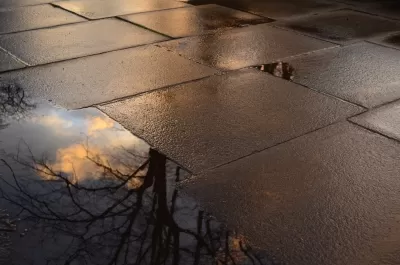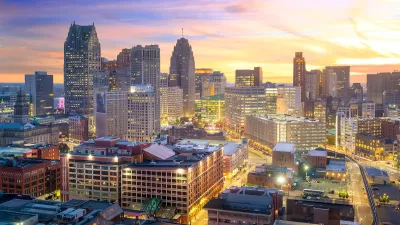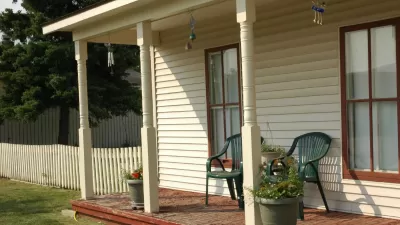The city says the increased fees that many people are seeing reflect a more equitable billing system, but residents argue the charges are unfair.

Detroit water and sewer bills have risen quickly since the city rolled out a new drainage fee structure last year. In the past, residents paid a flat rate, and businesses were supposed to be charged based on the size of their water pipes or the "impervious acreage"—the area on the property covered with materials that prevent the absorption of water. The result, reports Joel Kurth, was that rates varied considerably and owners of large parcels often had lower drainage bills.
Now property owners pay $598 per impervious acre, and many have seen their monthly bills increase dramatically. They say the fees are unfair, particularly in a city with high tax rates and poverty levels. Questions have also arisen about whether the new charges are a fee or a tax. A tax, residents say, would require voter approval under Michigan state law.
"Detroit officials say the rates are fair, lowering fees for 56 percent of all residents and equitably spreading the cost of treating wastewater," says Kurth. But the city has also spent $1 billion in recent years to update its wastewater treatment facilities. The projected $150 million a year the new drain fees will bring in will help the city repay these infrastructure costs.
FULL STORY: Detroit is billing residents for rain. It’s going as well as you’d think.

Maui's Vacation Rental Debate Turns Ugly
Verbal attacks, misinformation campaigns and fistfights plague a high-stakes debate to convert thousands of vacation rentals into long-term housing.

Planetizen Federal Action Tracker
A weekly monitor of how Trump’s orders and actions are impacting planners and planning in America.

San Francisco Suspends Traffic Calming Amidst Record Deaths
Citing “a challenging fiscal landscape,” the city will cease the program on the heels of 42 traffic deaths, including 24 pedestrians.

Defunct Pittsburgh Power Plant to Become Residential Tower
A decommissioned steam heat plant will be redeveloped into almost 100 affordable housing units.

Trump Prompts Restructuring of Transportation Research Board in “Unprecedented Overreach”
The TRB has eliminated more than half of its committees including those focused on climate, equity, and cities.

Amtrak Rolls Out New Orleans to Alabama “Mardi Gras” Train
The new service will operate morning and evening departures between Mobile and New Orleans.
Urban Design for Planners 1: Software Tools
This six-course series explores essential urban design concepts using open source software and equips planners with the tools they need to participate fully in the urban design process.
Planning for Universal Design
Learn the tools for implementing Universal Design in planning regulations.
Heyer Gruel & Associates PA
JM Goldson LLC
Custer County Colorado
City of Camden Redevelopment Agency
City of Astoria
Transportation Research & Education Center (TREC) at Portland State University
Jefferson Parish Government
Camden Redevelopment Agency
City of Claremont





























